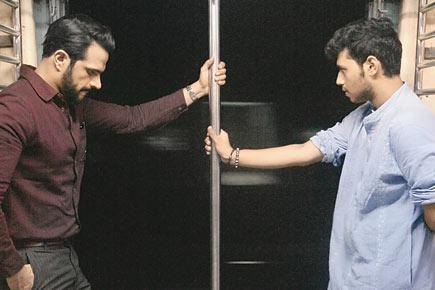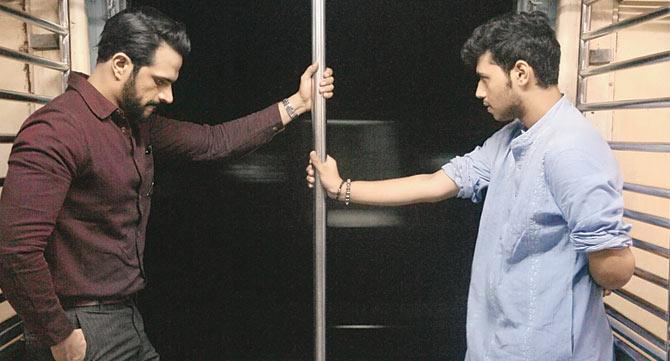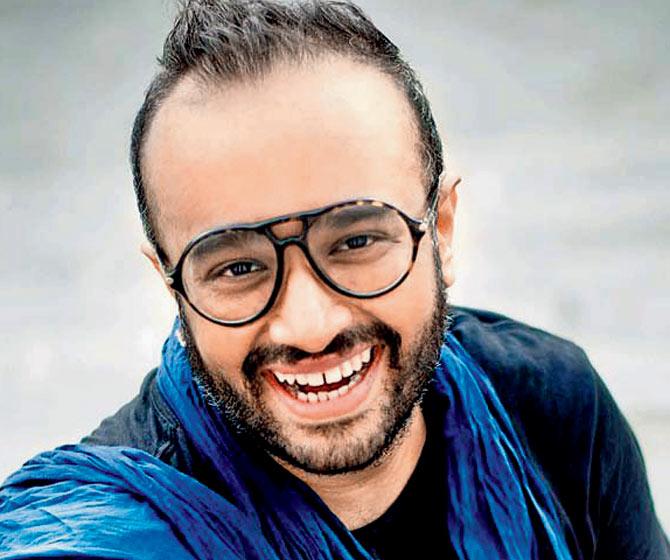India’s first silent LGBTQ love story is set to hit post-production stage, as soon as the makers generate funds through a crowdfunding platform

Actors Jitin Gulati (left) and Dhruv Singhal in a still from Sisak
![]() "Thank you for showing interest in my baby!" says a cheery Faraz Arif Ansari, director of Sisak that claims to be India’s first silent LGBTQ love story. The film, produced in the format of a short feature has been shot entirely inside Mumbai locals featuring two actors, a wafer-thin crew, a borrowed camera and no permissions. "I was working with Dharma Productions, as an assistant director on Gippi (2013).
"Thank you for showing interest in my baby!" says a cheery Faraz Arif Ansari, director of Sisak that claims to be India’s first silent LGBTQ love story. The film, produced in the format of a short feature has been shot entirely inside Mumbai locals featuring two actors, a wafer-thin crew, a borrowed camera and no permissions. "I was working with Dharma Productions, as an assistant director on Gippi (2013).
ADVERTISEMENT

Actors Jitin Gulati (left) and Dhruv Singhal in a still from Sisak
Post that, I directed a musical in Nainital, when I wrote my first ‘mainstream’ feature film that had a homosexual protagonist. That’s when I realised that nobody wants to make a commercial film that has a homosexual protagonist. Almost every leading actor from the country refused to act in it. Almost every production house in the country, including my friends in the industry, said they loved the script but backed out from producing it," shares Ansari.

Faraz Ansari
"The funny part is that production houses with homosexual individuals at their helm also refused to make it! And somewhere in between all the trials, tribulations, refusals and long, aimless journeys in the Mumbai local, Sisak was born," he adds.
The art of silence
"While touring festival circuits, I had realised that most LGBTQ films are about individuals coming out of the closet, or coming to terms with their sexualities or the various other social and political issues," shares Ansari. Sisak talks about the reason for all the protest, the simple feeling of love. "It takes you inside a wordless world of romance, where a public transport becomes the most private place for the two men to silently observe and fall in love with each other. They don’t talk to each other or touch each other in the film," he continues.
The ‘train’ing process
Ansari tells us that one of his greatest challenges was shooting in the locals. "Permissions to shoot on the local train cost R2.5 lakh per day for six hours, which is half a shift. I could shoot two films in that amount. So, we decided to skip permissions and shoot anyway," says Ansari, the irritation evident in his voice. "We chose to shoot between 10.30 pm and midnight in a train from Churchgate to Andheri.
Rehearsals were done prior as we didn’t have the luxury of doing a second take on most occasions because we couldn’t exceed the days of shoot either, as the camera had to be returned. Many passengers noticed us shooting but didn’t interfere. They probably thought we were college students filming an assignment," he jokes, adding that a passenger even offered them apples that she was carrying, as she thought they were working really hard. The food for the cast and crew was sponsored by Ansari’s family.
The crew includes, production designer Aparna Sud (of Neerja fame) who gave Ansari funds to rent a camera and lense. Finding actors who were willing to play the part turned out to be a nightmare too. "Actors from television shows and theatre refused to play the part saying that they would be typecast and would be offered only homosexual parts in future. One of the actors backed out three days prior to the shoot. Jitin Gulati, who plays one of the two characters in the film, responded to one of my rants on social media about not being able to find an actor. The other actor Dhruv Singhal is a college student. I had seen a film he shot for a college project and liked it. The audition for his part was simple. I wanted an actor who could read a book. You must see the audition tapes. People tried so hard to read a book, it was hilarious," says Ansari, adding that acting in a silent film is tougher than being in one with dialogues.
Wish list
"The final stage of the film — the post-production, includes editing (hiring an editor, renting out a studio suite for the edit of the film, the promotional video), sound design (studio rentals that are on hourly basis), a facility to do basic online work of colour correction and visual enhancement, background music (again studio rentals, live musicians, sound engineers) and some funds to send the film to national and international mainstream film festivals and not just LGBTQ festivals is why crowd-funding is required," says Ansari. The crowdfunding campaign will go live on Wishberry next week.
 Subscribe today by clicking the link and stay updated with the latest news!" Click here!
Subscribe today by clicking the link and stay updated with the latest news!" Click here!







